- Home
- Beverly Cleary
Emily's Runaway Imagination
Emily's Runaway Imagination Read online
Beverly Cleary
Emily’s Runaway Imagination
Illustrated by
Tracy Dockray
Contents
1. Emily Goes to the Post Office
2. Mama’s Elegant Party
3. Emily’s Snow-white Steed
4. Grandpa and The Tin Lizzie
5. A Tarnished Silver Dollar
6. The Scary Night
7. Emily and The Light Flaky Pie Crust
8. The Hard-Times Party
9. Emily and Fong Quock
About the Author
Other Books by Beverly Cleary
Credits
Copyright
About the Publisher
1
Emily Goes to the Post Office
The things that happened to Emily Bartlett that year!
It seemed to Emily that it all began one bright spring day, a day meant for adventure. The weather was so warm Mama had let her take off her long stockings and put on her half socks for the first time since last fall. Breezes on her knees after a winter of stockings always made Emily feel as frisky as a spring lamb. The field that Emily could see from the kitchen window had turned blue with wild forget-me-nots and down in the pasture the trees, black silhouettes trimmed with abandoned bird nests throughout the soggy winter, were suddenly turning green.
Everywhere sap was rising, and Emily felt as if it was rising in her, too. This made it difficult for her to sit still long enough to write to her cousin Muriel, who lived in Portland and had so many wonderful things–things like fleece-lined bedroom slippers with kittens on the toes, cement sidewalks to roller-skate on, and a public library full of books.
“Finish your letter, Emily,” said Mama, who was scrubbing out milk pans at the kitchen sink while the washing machine churned away on the back porch. “Then you can take it to the post office.”
Emily looked up from her letter. “Mama, I just know something wonderful is going to happen today,” she said. “I can feel it in my bones.”
Mama laughed. “Adventure is pretty scarce here in Pitchfork. I think your imagination is running away with you.”
Mama often said this and whenever she did, Emily could just see herself hanging on for dear life in a buggy pulled pell-mell down Main Street by a frightened horse, the way a horse once ran away with Mama when she first came out West to teach school. All Mama’s hairpins came out, her long black hair came tumbling down around her shoulders, and by the time someone stopped the horse she was a sight. Emily was always sorry she could not have been there to see the horse run away with Mama the way her imagination was supposed to run away with her.
Emily read Muriel’s letter once more.
Dear Emily,
This week I went to the library. I got Black Beauty. It is about a horse. It is the best book I ever read. I read it three times. I have to go now. Write soon.
Yours truly,
Muriel.
P.S. Mama sends her love.
It was not an easy letter to answer. Muriel was always writing about the library books she read–books like Heidi and Toby Tyler, which Emily had never even seen. Aunt Irene, Muriel’s mother, said Muriel was a regular little bookworm.
Emily did not envy Muriel the fleece-lined bedroom slippers or the cement sidewalk for roller-skating, but she did envy her that library. She longed to be a bookworm, although she did not think she would care to be called one. Unfortunately, the town of Pitchfork, Oregon, did not have a library. Oh, there were things to read–the Burgess Bedtime Story in the newspaper, Elson Reader Book IV, and the Sunday-school paper, but none of these qualified Emily to be a bookworm. Emily was not lucky like Muriel, who could ride a streetcar downtown to a big library full of hundreds, even thousands, of books, although of course Emily was lucky in other ways.
Emily was lucky because of Mama, who right now was sitting down to rest her feet while the washing machine did its work out on the back porch. Mama was so little she always wore high heels, even though she had a great big house to take care of. Tap-tap-tap went her heels all day long. Once, three years ago, during the war, when Mama had been an Honor Guard girl and had marched in a parade to get people to buy Liberty Bonds, she had lost one of her heels right in the middle of the parade, but that did not stop Mama. She had marched tap-bump, tap-bump all the way down Main Street to help sell Liberty Bonds. Mama had spunk.
It was funny about Mama’s being so small, because Daddy was big and strong and handsome. Once when he was just out of high school, some men came out from Portland and told Daddy he should be a prize-fighter, but Daddy said, no, thank you, he would rather be a farmer. This was lucky, because sometimes when Emily got into an argument with one of the girls at school, she settled it by saying, “My father could have been a prize-fighter if he’d wanted to, but he didn’t want to. So there!”
Emily was lucky in her ancestors, too. They had been pioneers, and whenever things were hard, Mama always said, “Remember your pioneer ancestors.” Emily had always liked the stories of their trip across the plains in their covered wagons. Now Emily’s pioneer ancestors were all dead and buried in the weedy little cemetery called Mountain Rest, but she did have Grandpa and Grandma Slater, Mama’s parents, right here in Pitchfork.
Emily was lucky in many ways. She was lucky in the house she lived in, a house with three balconies, a cupola, banisters just right for sliding down, and the second bathtub in Yamhill County. Emily did not know who owned the first bathtub, but having the second bathtub was still pretty important. It showed that their house, known as the old Bartlett place, was very old.
The house had thirteen rooms, half of them empty of furniture, and people often asked, “Don’t the three of you rattle around all by yourselves in that great big house?” Emily did not think she and Mama and Daddy rattled around at all. They moved around, it was true, but they did not rattle. Sometimes they slept in the downstairs bedrooms, sometimes in one or another of the upstairs bedrooms, and often on summer nights they slept out on one of the balconies under the stars. Sometimes they set up their Christmas tree in the sitting room and sometimes in the parlor. Mama said not many people could be gypsies in their own house.
“Mama, I wish Pitchfork had a library,” said Emily. “It isn’t fair for Muriel to have all the books.”
“That’s the way it goes,” said Mama, rubbing her foot. “This world’s goods are never evenly divided.”
“But just suppose we did have a library. Then I could read Black Beauty and fairy stories–anything I wanted. Suppose Pitchfork had a library with one hundred thousand books!”
“There goes your imagination again,” said Mama.
“But it does seem as if library books could be evened up a little.” Emily, who was often lonely, spoke wistfully. The Bartlett front porch was just inside the town limits, but the rest of the house, and the barn and fields, were in the country, and there was no one near for Emily to play with.
“Emily, you are right,” said Mama suddenly. “Go get the tablet of linen paper. I am going to write a letter for you to mail.”
“Who to?” asked Emily.
“The state library in Salem,” said Mama, who believed in never putting off until tomorrow what she could do today. “Times are changing. Other towns are getting libraries–there is already one in Cornelius. There’s no reason why Pitchfork can’t keep up with the times. Just think, Emily, there are people who have lived here all their lives who have never seen a library. And now I’m going to find out how to get a library started.”
“Mama!” cried Emily joyfully and, forgetting her own letter, she ran for the tablet of good writing paper. Let the washing machine churn on the back porch! Oh dear, oh dear, oh dear, it seemed
to complain as it labored. Pooh to the washing machine! Let it complain. Mama was writing a letter, an important letter, and Emily was going to get to mail it.
Soon Mama had the letter written and addressed in her neat schoolteacher handwriting. Emily licked a stamp, placed it on the envelope, and pounded it down with her fist so it would be sure to stick tight. This was a very important postage stamp and it must not fall off on its way to Salem, the capital of Oregon.
Emily put on her coat and went skipping off to the post office. Her knees, exposed for the first time in months, felt chilly, but she did not care. She was off to adventure. She would mail the letter and spread the glad tidings that maybe there was going to be a library in town. A library that might even have Black Beauty.
Emily heard a bark and found Prince, the collie, loping after her. “Come on, Prince,” she called, glad to have the company of the good-natured dog.
Prince was the Bartletts’ loafing dog. It was old Bob, a bobtailed black shepherd, who worked around the place, rounding up the cows and keeping an eye on things. Daddy always said old Bob was as smart as most people. Not Prince. He had just turned up one day, and although Daddy had published a notice in the weekly paper, the Pitchfork Report, no one claimed him. Daddy said he could see why, but he also said another dog around the place didn’t make much difference one way or another, and even though the collie wasn’t good for much, he did seem to be a prince of a fellow. The dog stayed and was named Prince. Now as Emily patted his head, he wagged his plumy tail, as if he too felt the arrival of spring and was eager for adventure.
Together they traveled over the board sidewalk, past Pete Ginty’s carpenter shop and Fong Quock’s house and vegetable garden, until they turned the corner by the Masonic Hall. Then they were on Main Street, which was paved and had a cement sidewalk.
Emily was not the only one in Pitchfork who felt as if the sap was rising within. Bertie Young, the barber’s son, came running down the sidewalk, rolling an old automobile tire in front of him. When he reached Emily he stopped. “Hello, Emily,” he said, bending over. “Want to smell my haircut?”
Emily inhaled deeply. M-m-m. Lilac! Bertie had the fanciest-smelling haircuts of anyone in town.
After Bertie had gone on, Emily met her cousin June Bartlett, who was going to the drugstore for her mother. June’s barrette was sliding out of her hair, but she did not care. That was the difference between Emily and June. Emily cared about things. June did not. This was sometimes discouraging to Emily, but in Pitchfork cousins were expected to like one another and no nonsense about it.
“Guess what!” said Emily. “Maybe we are going to have a library right here in Pitchfork. I’m going to mail a letter about it right now.”
“You mean with books?” asked June.
“Of course,” answered Emily, exasperated. What else could be in a library?
“We have a Tarzan book at home,” said June, and went on her way to the drugstore, stepping on all the cracks as she went.
When Emily and Prince reached the post office, Emily took one last look at the important letter addressed to the state librarian before she poked it through the slot. Because the window was not yet open, she leaned over and peeked through the slot at her Uncle Avery, who was not only postmaster but mayor of Pitchfork as well. He was busy cranking letters through the machine that postmarked the envelopes.
“Uncle Avery,” she said through the slot. “Guess what! Maybe Pitchfork is going to have a library.”
“Well now, won’t that be nice,” answered Uncle Avery, cranking away at the postmarking machine.
As Emily was about to leave the post office, she ran into Fong Quock, the only Chinese left of the many who had once lived around Pitchfork. Emily felt shy when she was with the old man, even though he was her closest neighbor and she was really very fond of him. She had known him all her life, and Daddy had known him almost all his life, too. Fong Quock had come from China when he was a young man and Daddy was a boy. He had settled near the Bartlett house, where he took in washing and raised vegetables to sell. When one of the Bartlett boys had a stomachache from eating too many green apples, or broke his arm falling out of the haymow, Grandma Bartlett had always sent Fong Quock for the doctor, and off he would go, lickety-split, with his queue flying and his slippers flapping. Now of course he no longer wore a queue or slippers. He did not take in washing, either. He had recently sold the confectionery store where the people of Pitchfork had for many years bought their all-day suckers and ice-cream sodas. He dressed like everyone else and was too old to go lickety-split. Daddy and all Emily’s aunts and uncles loved Fong Quock, and no wonder. He was such a kind, jolly little man.
Emily was ashamed to feel shy with Fong Quock, but the truth of the matter was she had a hard time understanding him. His English was not very good, and no matter how hard he tried he never could pronounce the letter r. It always sounded like l. Mama said she could certainly sympathize. When she studied German in high school back East she never could learn to pronounce r in the proper German way.
“Hello, Missy,” said Fong Quock, who called all the little girls in Pitchfork Missy.
“Good morning, Mr. Quock,” answered Emily politely.
Prince, who always liked attention, went over to the old man and wagged his tail hopefully. Fong Quock patted his head and said, “Nice doggie. You name Plince, eh, fellow?”
Without thinking, Emily said politely–at least she meant to speak politely, “No, it’s Prince, Mr. Quock.” And the words were no sooner out of her mouth than she realized what a dreadful mistake she had made. Fong Quock had been trying to say Prince, but he could not pronounce the r. She felt her cheeks grow hot. She would not have hurt the old man’s feelings for anything in the world.
“Yes,” said Fong Quock, nodding as his wrinkled face crinkled with amusement. “Plince.”
Everyone in the post office laughed and so did Fong Quock. He threw back his head and laughed as if he thought the whole thing a huge joke. But Emily did not think it was funny, not one bit. She was so embarrassed and humiliated that she turned and fled.
Prince came padding after her. “What did you have to come tagging along for?” she asked, forgetting that she had been eager to share her feeling of adventure. From inside the post office she could hear people laughing–laughing at her.
Emily was not anxious to meet anyone who had been in the post office, so she decided to pay a visit to Grandpa and Grandma Slater in their store until the coast was clear.
On the false front of Grandpa’s store were the words W. A. Slater, General Merchandise. How Emily loved Grandpa’s store! One side, Grandpa’s side, was full of groceries–shelves of canned goods, bins of bulk foods to be weighed out on scales, a wheel of Tillamook cheese under an is-in-glass cover, a red coffee grinder, and a little chopper for cutting off plugs of chewing tobacco. Emily liked Grandma’s side, the dry-goods side, even better. It was filled with bolts of dress goods, spools of ribbon, a revolving case of sewing thread, skeins of embroidery cotton. The back of the store was least interesting–just overalls and work shoes and a big drum of coal oil. One of the nicest things about the store was that, although the Bartletts paid for everything they took, Emily was the only girl in town who was allowed to go behind the counters.
Grandpa was leaning over the counter figuring something on the back of an envelope, probably something called profit and loss. When Grandpa introduced Emily to someone he always said, “This is Emily. She’s the only granddaughter I’ve got, but she’s a humdinger.”
“Well hello, Emily,” he said, looking up from his envelope. “I’ll pay you a nickel if you can sit still for five minutes.”
Emily smiled. This was an offer Grandpa made almost every time she came to the store and usually she sat on a chair for five minutes by the clock to earn the nickel. She was saving up her sitting-still nickels to buy Mama a rotary eggbeater, the kind that would beat eggs and whip cream when you turned the handle around and around. This morn
ing, however, she decided against earning a nickel and in favor of going upstairs to the rooms where Grandpa and Grandma lived. She would say hello to Grandma and avoid anyone who might be coming to the store from the post office.
Upstairs was the best part of all–Grandma’s millinery room, where Grandma trimmed hats for the ladies of Pitchfork–and it was there that Emily found her grandmother, her mouth full of pins, trimming a white leg-horn hat with beautiful pink ribbon bows. Grandma nodded and smiled through her mouthful of pins. Dear gentle Grandma, who always smelled of violets.
Emily heard the merry ring of the cash register downstairs as Grandpa waited on his customers. To pass the time until they left she amused herself exploring the millinery room–the deep round boxes of untrimmed hats, bolts of veiling, boxes of flowers. There were velvet violets for winter hats, garlands of daisies and poppies, bunches of hard red cherries that rattled when Emily picked them up, stiff little nosegays of forget-me-nots, even artificial wheat, although why anybody would want to trim a hat with anything so ordinary as wheat Emily could not understand. And the ostrich plumes! Each beautiful curling plume lay in its own question-mark-shaped compartment in a big box. Grandma had dozens of lovely plumes, which she said would surely come back in style. Grandma said if you kept a thing seven years, it was bound to come back in style.
At last Grandma took the pins out of her mouth. “How are you today, Emily,” she asked.
“Just fine, Grandma.” Emily stabbed a pincushion with a hatpin. “Grandma, do you know maybe Pitchfork is going to have a library? Mama wrote a letter to the state library this morning and I mailed it.”
“Well now, wouldn’t that be nice?” Grandma deftly twisted a length of ribbon into a crisp bow. “Other towns have libraries, I’ve heard. There’s no reason why Pitchfork can’t keep up with the times.”

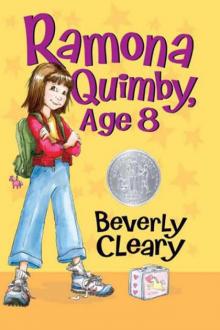 Ramona Quimby, Age 8
Ramona Quimby, Age 8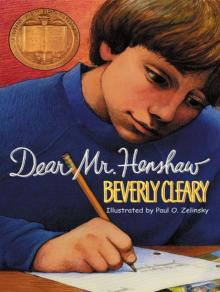 Dear Mr. Henshaw
Dear Mr. Henshaw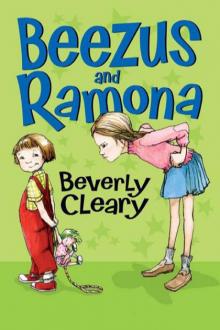 Beezus and Ramona
Beezus and Ramona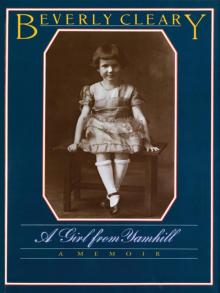 A Girl from Yamhill
A Girl from Yamhill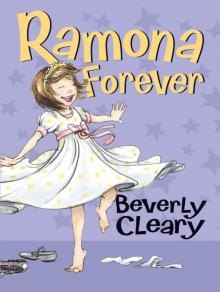 Ramona Forever
Ramona Forever Jean and Johnny
Jean and Johnny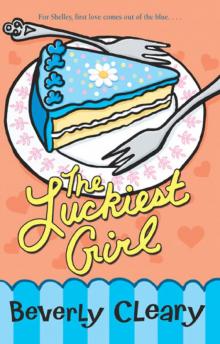 The Luckiest Girl
The Luckiest Girl Emily's Runaway Imagination
Emily's Runaway Imagination Ribsy
Ribsy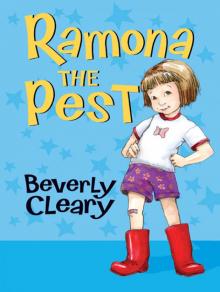 Ramona the Pest
Ramona the Pest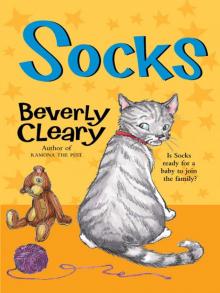 Socks
Socks Ramona's World
Ramona's World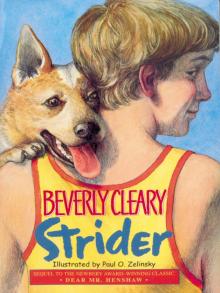 Strider
Strider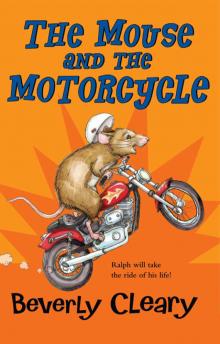 The Mouse and the Motorcycle
The Mouse and the Motorcycle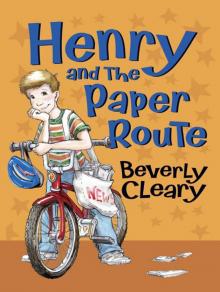 Henry and the Paper Route
Henry and the Paper Route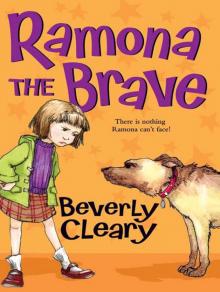 Ramona the Brave
Ramona the Brave Henry Huggins
Henry Huggins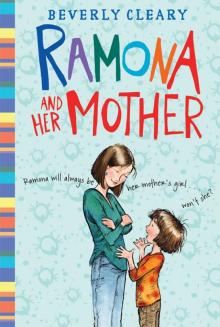 Ramona and Her Mother
Ramona and Her Mother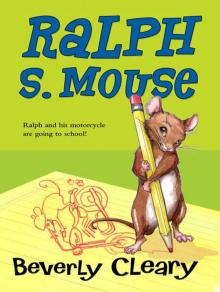 Ralph S. Mouse
Ralph S. Mouse Sister of the Bride
Sister of the Bride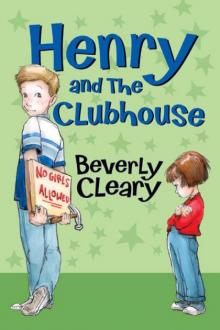 Henry and the Clubhouse
Henry and the Clubhouse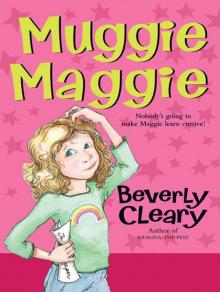 Muggie Maggie
Muggie Maggie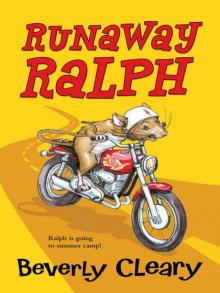 Runaway Ralph
Runaway Ralph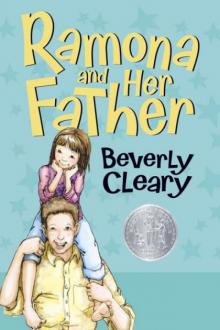 Ramona and Her Father
Ramona and Her Father Henry and Ribsy
Henry and Ribsy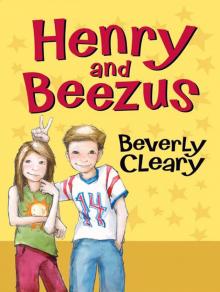 Henry and Beezus
Henry and Beezus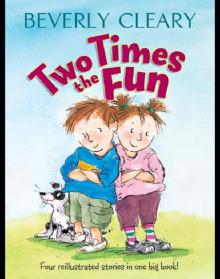 Two Times the Fun
Two Times the Fun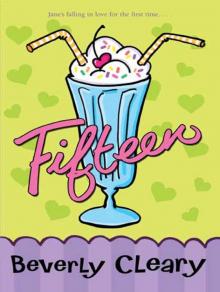 Fifteen
Fifteen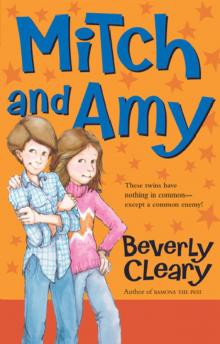 Mitch and Amy
Mitch and Amy